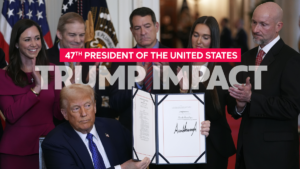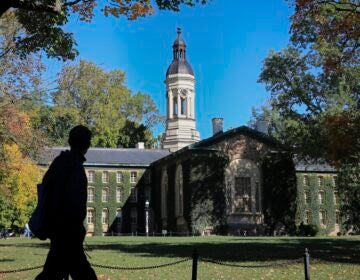Federal cuts threaten Princeton University program for formerly incarcerated persons
The university’s Prison Teaching Initiative has built partnerships to scale programs that provide formerly incarcerated students with research opportunities.
Listen 3:30
From left, Azael Montejo Jr., Hardwick Stiers and Naeem Santiago are students in the summer internship program at Princeton University's Prison Teaching Initiative, which offers paid opportunities to gain research experience (P. Kenneth Burns/WHYY)
From Camden and Cherry Hill to Trenton and the Jersey Shore, what about life in New Jersey do you want WHYY News to cover? Let us know.
For more than two decades, Princeton University professor Jannette Carey has provided community college students and formerly incarcerated persons with research opportunities in science, technology, engineering and math.
“I think I do value it more than my teaching at Princeton,” the chemistry professor said. “It’s been a complete joy to me to be able to work with students.”
Some of her interns come through the university’s Prison Teaching Initiative, or PTI.
Now, the National Science Foundation told the university that it is withdrawing support from the program. She called the grant termination “a real tragedy.”
“The program had done a great deal of good for a good many of years,” she said. “The lost opportunities for training additional students and getting students interested in STEM who might not have been otherwise is really a loss to the whole country.”
Since January, the Trump administration has sought cuts to diversity, equity and inclusion programs. For nearly a decade, PTI was funded by various NSF grants, including through the INCLUDES Initiative, which aimed to broaden participation in STEM fields.
“That program now no longer exists at NSF because it was viewed as a diversity program,” said Jenny Greene, an astrophysical sciences professor and PTI’s faculty director. “We had plans to use our part of the money to continue building new programs across the country.”
Overall, NSF grants that sought to provide marginalized communities pathways into STEM or other undergraduate research opportunities have been cut. Rutgers University reported that $6.6 million in NSF grants have been canceled since January, including $4.7 million in Louis Stokes STEM Pathways and Research Alliance grants to the New Brunswick and Newark campuses.
Rowan University, during the same time frame, has lost $333,845 in funding for projects aimed at broadening participation in engineering education initiatives. This includes a program with Drexel University to “increase STEM degree attainment in underrepresented populations,” according to Rowan.
The scaling back on diversity, equity and inclusion programs was outlined in President Trump’s inaugural speech when he vowed to “forge a society that is colorblind and merit-based.”
But Hardwick Stiers, who is in PTI’s Coding Foundations of Research group, questions whether the administration can reach that goal by erasing programs such as the one offered by Princeton.
“If there’s only a select few in the talent pool, how do you find more talent?” he asked, adding many have not had the opportunity to learn base knowledge and prove themselves.
“When you say merit-based, you’re just saying I want to pick out of a very small pool and not even give anybody else a chance,” Stiers added.
Princeton focuses on sustaining its program as NSF cuts end expansion dreams
Princeton was creating a toolkit to create programs similar to PTI at Howard, Tulane and San Francisco State universities.
“You’re talking about community organizations who all come together and have been looking for ways to ensure that a transition to STEM for justice-impacted people could be a bit more supportive and inclusive,” said Christopher Etienne, PTI’s student engagement coordinator. “It took us years to put together what a sustainable model would look like. As soon as we finished that model … we can’t use it.”
Greene said they have not got an explanation or answers from NSF about the future. The federal agency declined to comment.
“The program officers are really trying to support their programs any way they can,” she said. “They don’t know what’s happening themselves.”
Princeton officials said while they will maintain the partnerships they built up, they will focus on keeping their work going.
“Right now, we’re protecting home,” Etienne said. “We’re sitting down, reaching out to alum, reaching out to various organizations that understand the importance of this cause.”
Leveling the field
Azael Montejo Jr., an intern in the Velez CoLab, shared about the researchers from different backgrounds that he worked with over the summer.
“We weren’t just learning, we were actively working on real problems from understanding human cognition to developing new technologies,” he said, adding that the funding cut doesn’t just close the door on someone’s future, “you might be losing the person who would have cured a disease, founded a game-changing company or solved the major social problem.”
Other participants told WHYY News that without the PTI program, they wouldn’t have the opportunity to study at Princeton for the summer.
“When you think about all of the children, all of the people who come from the communities where I come from, if not having a bridge to link you with resources like this, how else do you get there?” asked Naeem Santiago, a student in the Coding Foundations of Research group.
He described going from being incarcerated to studying at the Ivy League institution as “beyond worldly.” He is looking forward to using what he learned as part of a career in social work.
“I’m thinking about my ability to utilize those skills and to utilize data and to be able to come up with statistics to present to potential lawmakers and things of the such to be able to provide some type of outlook and some type of guidance on what I think may help in the implementation of certain laws, or even in my own projects,” he added.
Ali Muslim, who has worked part-time for PTI since participating in the Aspiring Scholars and Professionals internship program in 2022, said the program levels the playing field. He graduated with honors from Rutgers University-Camden in May 2024 and was a commencement speaker during the ceremony.
Muslim said society often does not see the change in a formerly incarcerated person, especially when there are decades between when someone starts a prison sentence and when they end.
“I was arrested in ‘85, I came home in 2021. When I go for a job interview, they think I’m the ‘85 person,” he said. “I was a teenager back then. I’m a whole, completely different person.”
Muslim, who will begin studying social work at Rowan University’s graduate school this fall, said the PTI program opens doors for students.
“I don’t care if you didn’t go to Princeton University, you did an internship at Princeton University,” he said. “When you see that on a résumé, that pops out to somebody.”

Get daily updates from WHYY News!
WHYY is your source for fact-based, in-depth journalism and information. As a nonprofit organization, we rely on financial support from readers like you. Please give today.








